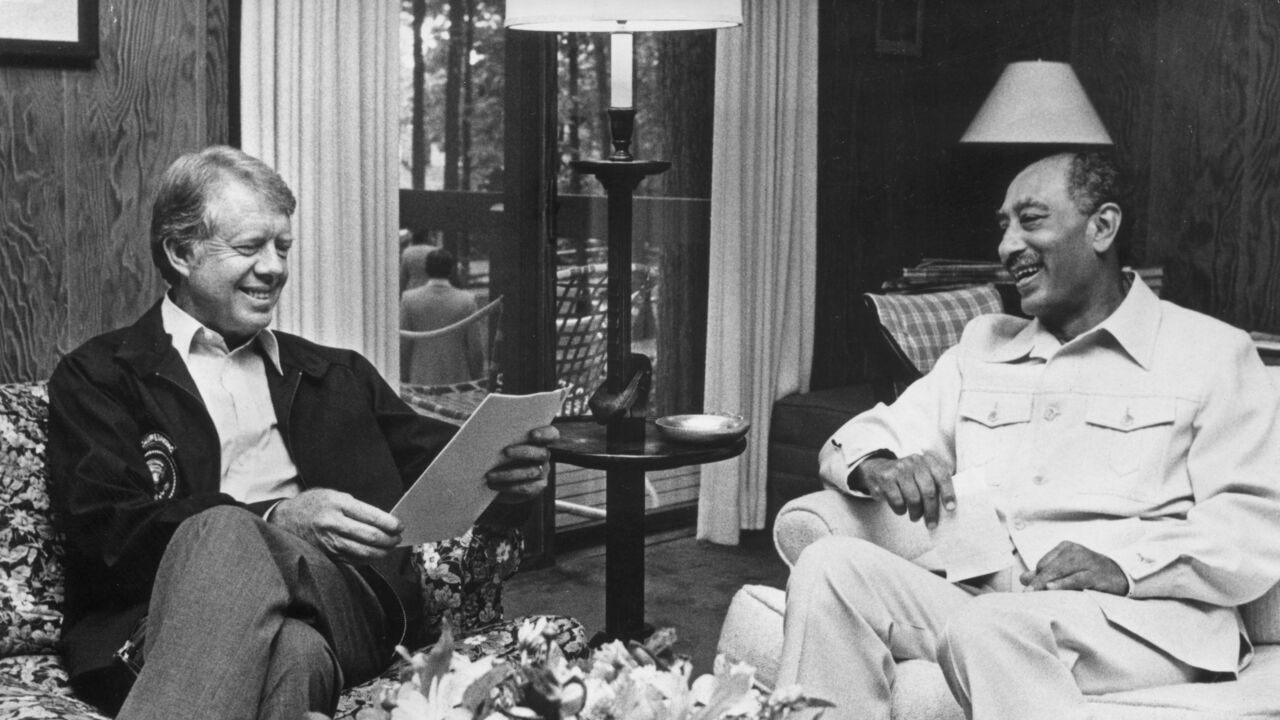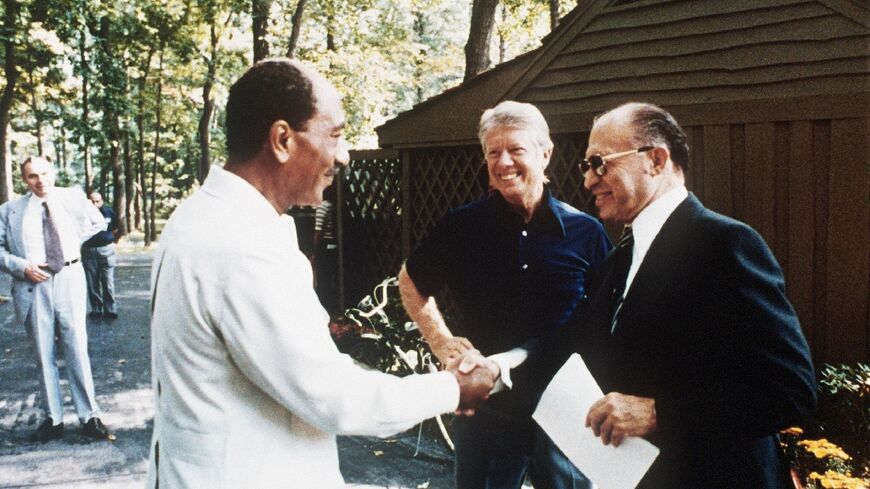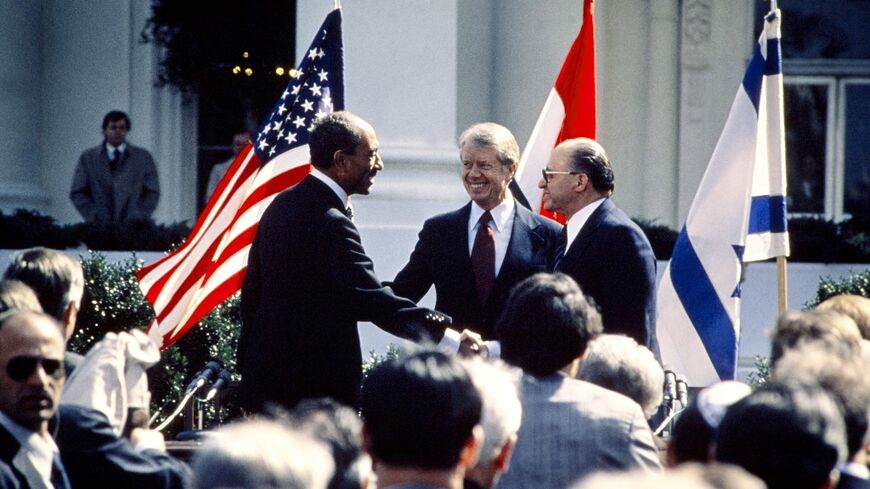Jimmy Carter, 1924-2024: Legacy of peace in Middle East
The United States' late President Jimmy Carter was a devout Christian who prioritized calming the Arab-Israeli conflict during his term in office.

Former US President Jimmy Carter died on Sunday, nearly two years after having entered hospice care at his Georgia home and ceasing medical treatment on Feb.18, 2023.
At the age of 100, Carter was the country’s oldest living former president. He served one term in office from 1977-1981. After facing serious foreign policy challenges during his tenure, the former governor of Georgia was defeated in his reelection bid by Ronald Reagan in November 1980. Nonetheless, Carter has left an enduring and principled legacy in a region marred by conflict.
One of Carter’s greatest achievements was in foreign policy in the Middle East, as he brokered the first ever peace agreement between Israel and an Arab country. Under Carter's watch, Egypt's late President Anwar Sadat and former Israeli Prime Minister Menachem Begin agreed to bury decades of hostility and sign the historic Camp David Accords in 1978.
Carter, who was born to humble beginnings in 1924, was a devout Christian and his faith and desire to see peace in the Holy Land made him prioritize the Arab-Israeli conflict when becoming the 39th US president.
In March 1977, hardly two months after assuming office, Carter announced support for establishing a "homeland" for the Palestinians. However, his plan for a comprehensive agreement could not materialize due to various hurdles like US policy that restricted official contacts with the Palestine Liberation Organization and difficulties in convincing Israel. Divisions appeared within the Arab camp, further complicating matters.
However, in personally conducting a landmark peace deal between Egypt and Israel, Carter managed to achieve a breakthrough where all his predecessors had failed.
Soon after taking office, Carter attempted to mediate the Arab-Israeli conflict by reconvening the 1973 Geneva Conference, but those efforts collapsed by the end of 1977. Having fought four major wars in 1948 plus a war of attrition along the Suez Canal, Israel and Egypt were difficult neighbors.
Carter broke the impasse in 1978 when he invited Sadat and Begin to a summit at the historic US presidential retreat in Maryland. He initially tried to involve other Middle Eastern parties such as Jordan, Syria and the Palestinians. The tripartite talks continued for two weeks as the terms of a peace agreement were mulled over.
Finalized in September 1978, the Camp David Accords established the framework for a historic bilateral peace treaty between Cairo and Tel Aviv in March 1979. It was also a milestone event for US diplomacy as the text upon which it was based was drafted by American Middle East experts.
At the time, the Camp David agreement prevented a war in the Middle East. Even now it remains a key element of US security policy in this region. In the larger picture, the Camp David Accords also helped pave the way for dialogue between Israel and the Arab states, even though the Palestinians were not included.
Mohamed Soliman, a scholar at the Middle East Institute, described Carter's presidency as "consequential" for the region.
"The Camp David Accords minimized the prospects of conflict between Israel and Egypt, the largest and most powerful Arab state, and provided a foundation for deepening the Arab-Israeli anchor of peace. For the past 40 years, the Camp David Accords and the Carter Doctrine have been the pillars of US Middle East Policy, making Carter one of the most consequential presidents in US history when it comes to the region," Soliman told Al-Monitor.
"Fast forward to 2023, the alignment between Israel and Arab states under the Abraham Accords [normalized relations between the UAE and Israel] and the Negev Forum could be traced to President Carter’s Middle East policy," Soliman argued.
The Carter Doctrine, issued in 1980 at the height of the Cold War between the Soviet Union and the United States, pledged that Washington would employ military force against any country that attempts to gain control of the Gulf region, and was designed to curb Moscow's influence in the Middle East.
Legacy watered down by Iran hostage crisis
Soon after this phase, new developments like the Iranian revolution distracted the Carter administration in the Middle East. On Nov. 4, 1979, militant Iranian students stormed the US Embassy and refused to release the staff they captured, infuriated over the US government allowing Iran's ousted shah to reach New York for medical treatment.
Unfortunately, despite the UN Security Council demanding their release with a unanimous vote, the hostage crisis did not end there. Two weeks later, Iran’s political and religious leader, Ayatollah Ruhollah Khomeini, let all the non-US captives go, but not the 52 American diplomats and embassy staff.
Dragging on for 14 months, the hostage crisis made President Carter hugely unpopular at home as he remained unable to resolve the issue by diplomatic means. Resorting to desperate measures, on April 24, 1980, he sent a disastrous rescue mission called Operation Eagle Claw in which none of the hostages were released and eight US military personnel were killed.
John Ghazvinian, a historian on US-Iran relations and executive director of the Middle East Center at the University of Pennsylvania, told Al-Monitor that the hostage crisis was a defining moment for both Carter's legacy and the US footprint in the region.
"Jimmy Carter’s presidency, and ultimately his legacy, was defined by the Iran hostage crisis perhaps more than it was by any other single event. The Iranian revolution was by no means Carter’s fault, as some of his critics claimed, and his decision to admit the ailing former shah of Iran to the US for cancer treatment was taken for mostly humanitarian reasons," Ghazvinian said.
He said the Islamic revolution reshuffled the deck in the region. "It unleashed forces that have fundamentally reshaped our world in the past four decades. America lost a critical ally in 1979, and Carter lost his presidency. But the hostage crisis also ushered in an era of Islamist radicalism whose consequences are still being felt," the historian said.
Responding to public opinion and trying not to look weak, he attempted to decisively tackle the failure of the hostage crisis, military rescue mission and other events that year. However, the effort did not win him reelection. Together, the Iranian revolution and the ensuing hostage crisis had taken Carter down and Republican candidate Ronald Reagan beat him in the polls.
On Jan. 20, 1981, soon after Reagan’s inauguration, the 52 captives held at the US Embassy in Tehran were released and the 444-day hostage situation ended.
Even though Carter remained committed to social justice and human rights during his presidency, only his first two years were successful. After his defeat, he established the Carter Centre in 1982, his post-presidential activities furthered his vision of global diplomacy and economic justice away from the limelight.
In 2002, Carter was awarded the Nobel Peace Prize “for his decades of untiring effort to find peaceful solutions to international conflicts, to advance democracy and human rights, and to promote economic and social development,” according to the organization.
Giving his Nobel Lecture on the occasion, Carter described his life's mission, saying, “The bond of our common humanity is stronger than the divisiveness of our fears and prejudices.”
Carter had a 34% approval rating when he left office in 1981, but this figure rose to 45.5% after he won the peace prize. Despite his improvement, Carter remained sidelined from the American political scene for the rest of his years.
Even though Carter had faced a severe backlash due to the crises during his term, emotional tributes flooded social media soon after the announcement of his death as a grateful public focused more on what he did after his presidency than during it.
As Michael Johnson, a historian at Johns Hopkins University, told the Washington Post, few presidents “get a public preview of their place in American hearts.”







